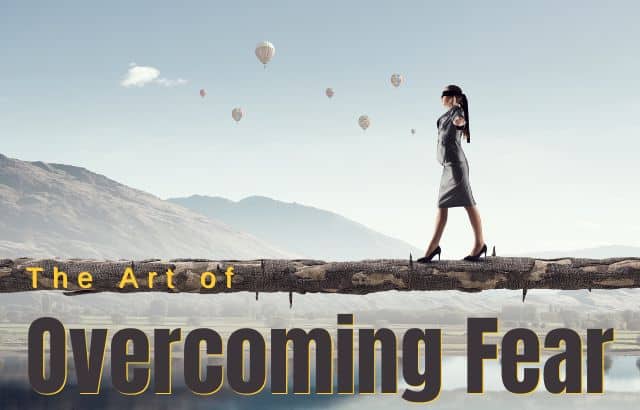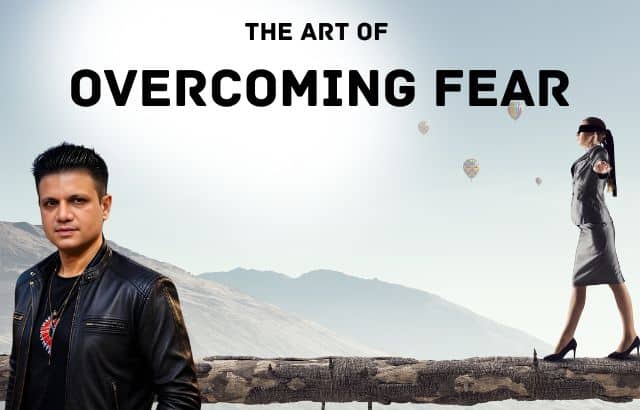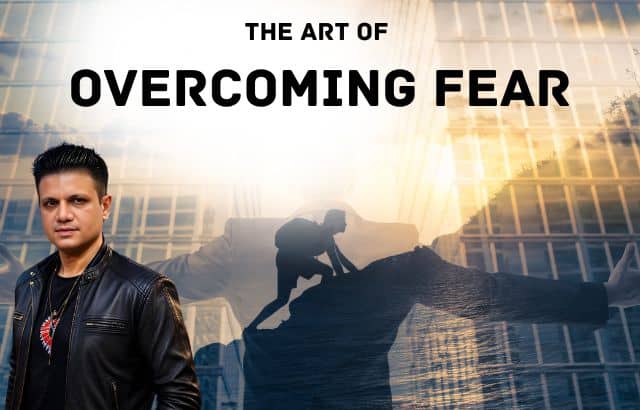Overcoming fear is a common and important challenge that many people face in various aspects of their lives. While fear is a natural human response, it can sometimes hold us back from reaching our full potential or pursuing our goals. The art of overcoming fear involves developing strategies and mindset shifts to confront and manage our fears effectively
Table of Contents
Overcoming fear is OK but What Makes You Scared

BRAIN CREATES FEAR – LEARN TO OVERCOME IT
What makes us afraid? Snakes, the dark, rejection, love, spiders, the obscure, public talking, flying, storms, failure — however, the reasons are different; we are all designed to feel fear. Or, on the other hand, correct?
Fear is a natural human emotion that has evolved over time to help us survive in dangerous situations. When we encounter a potential threat, our brains release hormones that trigger the “fight or flight” response, preparing our bodies to either confront the danger or run away from it. While fear can be uncomfortable and even debilitating at times, it also serves an important purpose in keeping us safe. By alerting us to potential dangers and helping us avoid them, fear can actually be beneficial in certain situations.
Celebrated Astro Strategist cum Business Astrologer Hirav Shah says, “Shouldn’t something be said about individuals who never appear to be afraid? Or then again, the little level of the populace that in a real sense can’t feel fear? For what reason are there kids totally unafraid of facing challenges, and afterward other people who appear to be afraid of everything?”
Fear is a natural response to perceived danger or threat, and it serves an important purpose in keeping us safe from harm. However, excessive or irrational fear can also hold us back from pursuing our goals and living our lives to the fullest. It’s important to understand the science behind fear and learn how to manage it effectively, so that we can reap the benefits of fear without letting it control us.
The Biology of Fear

Fear in humans isn’t controlled by a single switch but involves multiple brain areas. The amygdala, a small, almond-shaped cluster of neurons deep in the brain, plays a central role. When the amygdala detects potential danger, it sends out excitatory signals to other brain regions, alerting them to assess the threat and guide the response.
In contrast, people with the rare Urbach-Wiethe disease have calcified amygdalae and are unable to process fear. Only about 400 individuals globally have this condition, which highlights that fear, while crucial for survival, might not be as essential as previously thought. This has led to insights that logical reasoning can sometimes replace fear-based responses.
Fear can also be triggered by sensory cues. A study found that the scent of fear sweat could activate the brain’s fear centers, suggesting that humans might respond to fear similarly to animals that use warning pheromones. These findings imply that being around fearful individuals can induce fear in others, which can influence everyday decisions and behaviors, from avoiding challenges to taking new opportunities.
Overcoming fear – Cultural Fears and Modern Life

Mental investigations additionally substantiate this thought of aggregate fear having a more extensive cultural effect. During the 1970s, Roger Hart concentrated on the youngsters in a little Vermont town to perceive what they did when they weren’t under direct adult oversight, finding out about their secret spots for play and most loved where they meandered. He returned in 2004 and discovered a totally extraordinary arrangement of standards. These parents, some of whom were subjects during the 1970s research, are substantially more worried about the moment-by-minute realities of their youngsters’ lives.
Solo play is practically unbelievable, and kids stay a lot nearer to home. However, crime percentages are actually equivalent to what they were 40 years prior. “There’s a fear” among the parents, Hart disclosed to The Atlantic, “a distortion of the risks, a deficiency of trust that isn’t absolutely obviously logical.”
In any case, in case you’re encircled by other people who aren’t afraid to allow their children to meander around, odds are you will not be by the same token. There is power in who we encircle ourselves with, just as how our way of life moves its standards. As Hirav Shah says, “Who you invest energy with is who you become.”
This is only one illustration of how fear regularly comes from the narratives we advise ourselves; we bet you can consider more. Oftentimes parents project their own fears onto kids or get them to rehash their own fear-driven patterns. Different stories we advise ourselves can lead us to fear everything from rejection to success. How at that junction would we be able to deal with keeping fear from keeping our youngsters or us down?
Approaches to Leverage Fear

You need to utilize fear; else, it utilizes you. Keep in mind; bravery isn’t being fearless and unafraid; it’s being fearful and accomplishing something at any rate. Approaches to utilize fear incorporate sorting out what your fear enlightens you regarding your present circumstance and what it can educate you.
One way individuals handle their fear is to drive themselves to confront limits, regardless of whether ascending mountains or strolling over coals. Simply take the firewalk at UPW. Rather than allowing fear to win, individuals incline toward their fear and discover they can accomplish anything they set their attention to.
As an 11-year-old fire walker clarified, you need to intellectually get ready for the experience, “else you give up to the fear, and that will overcome different pieces of your life.” Fire strolling caused him to feel like “Superman”; “It steered clear of my feet, however was tied in with following through on a guarantee.”
Hirav Shah Decodes the Art of Overcoming Fear

1. “Fear of rejection is the barrier between where you are and where you want to be.”
Explanations:
Fear of rejection often stems from a deep-seated anxiety about not being good enough or being judged negatively. This fear can prevent us from pursuing new opportunities, thereby limiting our growth and progress.
Strategy:
To overcome this fear, shift your focus from the potential negative outcomes to the benefits of taking action. Recognize that rejection is a natural part of the journey and not a reflection of your worth.
Execution:
Begin by setting small, achievable goals that push you slightly outside your comfort zone. Celebrate each small victory to build confidence and resilience. Gradually increase the scale of your goals as you become more comfortable with the idea of rejection.
Example:
If you’re afraid of pitching an idea to a potential client, start by practicing your pitch with friends or colleagues. Each successful pitch, even if it’s just practice, will help reduce your fear of rejection when you finally make the real pitch.
2. “The only way to conquer fear is to face it head-on.”
Explanations:
Avoiding fear only strengthens it. Facing fear directly allows you to confront and diminish its power over you, fostering personal growth and resilience.
Strategy:
Identify the specific fears you face and develop a plan to tackle them incrementally. Use exposure therapy by gradually increasing your exposure to the feared situation until it becomes less intimidating.
Execution:
Create a step-by-step plan to address your fear. For instance, if you’re scared of public speaking, start by speaking in front of a small group of friends before progressing to larger audiences.
Example:
If you’re afraid of flying, start by taking short flights or even a virtual flight simulation to get used to the idea. As your comfort level grows, you can take longer flights, gradually reducing your fear.
3. “Fear is not a barrier but a signal for change.”
Explanations:
Fear often indicates that you are on the brink of a significant change or growth opportunity. Instead of viewing fear as an obstacle, see it as a sign that you are pushing your boundaries.
Strategy:
Embrace fear as an indicator that you are moving towards something meaningful. Reflect on what changes or new challenges might be arising and use fear as motivation to drive forward.
Execution:
When you feel fear, analyze what it might be signaling. Are you about to take on a new project or enter a new phase of your career? Use this insight to focus on the opportunities that lie ahead.
Example:
If you feel fearful about starting a new business venture, recognize that this fear might be a signal of an exciting opportunity for growth. Use this realization to fuel your preparation and strategic planning.
4. “Overcoming fear requires preparation and practice.”
Explanations:
Fear often arises from uncertainty or a lack of preparedness. By investing time in preparation and practicing your skills, you can build confidence and reduce anxiety.
Strategy:
Develop a routine of regular practice and preparation for the tasks or challenges that trigger your fear. This approach helps in building competence and confidence.
Execution:
Create a schedule for practicing the skills or scenarios that cause fear. Track your progress and adjust your practice as needed to ensure you are well-prepared.
Example:
If public speaking makes you nervous, join a speaking club like Toastmasters. Regular practice and feedback from peers will help you improve and reduce your fear over time.
5. “Turning fear into a source of motivation can unlock your true potential.”
Explanations:
Fear can be transformed from a paralyzing force into a powerful motivator. When you channel your fear into energy and determination, you can achieve greater results.
Strategy:
Reframe your fear as a source of motivation by setting ambitious goals and using the energy from fear to drive your actions. Focus on the potential rewards of overcoming fear.
Execution:
Identify the fear you are experiencing and set specific, challenging goals that will push you to confront it. Use the fear as a driving force to stay committed and focused on your objectives.
Example:
If you’re afraid of failure in a new business venture, use that fear to fuel a meticulous business plan and strategy. Let the fear motivate you to work harder and more strategically to ensure success.
Overcoming fear – Frequently Asked Questions

What are some proven methods to accelerate business growth?
Answer: Implementing effective marketing strategies, optimizing operational processes, and fostering innovation are proven methods to accelerate business growth.
How can I overcome the fear of rejection?
Answer: To overcome the fear of rejection, shift your focus to the benefits of taking action, set small goals, and gradually increase your challenges.
What are the benefits of facing fear head-on?
Answer: Facing fear head-on allows you to reduce its power over you, confront underlying issues, and build resilience through direct experience.
How can I use fear as a motivator?
Answer: Reframe fear as a source of energy and motivation by setting ambitious goals and using the emotional intensity to drive your actions and strategies.
What strategies can help in practicing overcoming fear?
Answer: Develop a routine of regular practice, start with smaller challenges, track progress, and adjust your approach to gradually build confidence and reduce fear.
Final Lines

Hirav Shah concludes
Regardless of your age, you’ll never overcome a fear keeping you down by leaving it. Take mental fortitude and focus on what the fear will bring your direction, and you’ll be really relentless.
Everybody fizzles. Successful business proprietors. World leaders. Unmistakable gourmet specialists. Artists and researchers, and specialists. Our public avoids discussing failure and rather commends triumphs; this gives the bogus impression that to be really successful, you should never come up short. In any case, part of defeating fear perceives that everybody in the world – including those you know and respect – has experienced failure on their way to significance. The faster you understand your fear of failure is keeping you from settling on the choice to achieve your dreams, the sooner you’ll have the option to acknowledge the chance of falling flat and proceed onward. Stand against your fears, the brave is not he who does not feel afraid, but who conquers that fear.
How you react to fear is the thing that separates you from the remainder of the group. Advance your own boundaries at Unleash the Power Within, where you’ll figure out how to defeat fear and tap into your internal power.










